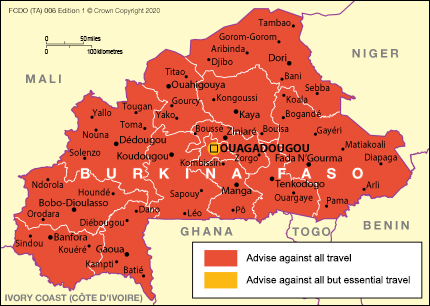Burkina Faso
Summary

For security reasons, the FCDO advises against all but essential travel to:
- the capital Ouagadougou, up to the toll booths on all roads out of the city
The FCDO advises against all travel to:
- the rest of Burkina Faso
There have been reports of civilgunfire unrest in the capital, Ouagadougou, since Friday 30 September, including at the Baba Sy military camp, around Kosyam Palace and in other residential areas of the city. Military roadblocks are in place and the television network has been suspended. You should be extra vigilant, keep adequate stocks of food and water, stay indoors, where possible and follow the advice of the local authorities.
LandAs of Friday 30 September 2022, land and air borders reopenedare onclosed Mondayand 3a October.curfew Thehas curfewbeen introduced between 9pm – 5am hasuntil alsofurther been lifted.notice.
The political situation in Burkina Faso is evolving and you should remain vigilant and monitor local media. While the Foreign, Commonwealth and Development Office continues to monitor the situation, we have no British Embassy in country and are very limited in the assistance we can provide.
Before you travel, check the ‘Entry requirements’ section for Burkina Faso’s current entry restrictions and requirements. Due to COVID-19, these may change with little warning. Monitor this advice for the latest updates and stay in contact with your travel provider.
If you plan to pass through another country on your journey, check the travel advice for the country you’re transiting.
It is more important than ever to get travel insurance and check it provides appropriate cover. See the FCDO’s guidance on foreign travel insurance.
Terrorists are very likely to try to carry out attacks in Burkina Faso, including Ouagadougou. Attacks could be indiscriminate and occur without warning, affecting Burkina Faso security forces, schools and markets. You should be especially vigilant and where possible avoid places frequented by foreigners including, diplomatic premises, hotels, restaurants, bars, nightclubs, shopping areas, airports and other transport hubs, places of worship and religious sites (particularly churches), national parks and businesses with Western interests. Foreign, national or local government facilities and large crowds may also be a target.
You should be vigilant, be alert to announcements, monitor local media and follow the advice of the local authorities. Avoid all large gatherings, including during national day celebrations and public holidays. On 26 April 2021, one Irish national and two Spanish nationals were killed in an ambush on the PK 60 road between Fada-N’Gourma and Pama. On 4 to 5 June 2021, over 160 people were killed in an attack on the village of Solhan in north-eastern Burkina Faso, and on 11 June 2022, over 100 people were killed following a terrorist attack in Seytenga. Further attacks are possible. You should exercise particular caution around religious holidays. See Terrorism.
Westerners have been kidnapped in Burkina Faso and the wider Sahel region. There remains a high threat of kidnap in Burkina Faso, including Ouagadougou, and the wider Sahel region. There’s also a risk that terrorist groups may cross the border from Mali and the northern border with Niger into Burkina Faso to carry out kidnap attacks, including in Ouagadougou. On 11 May 2019, four hostages, including westerners, were rescued during a French military operation in northern Burkina Faso. Two of the rescued hostages were French tourists who had been kidnapped from Pendjari National Park in Benin on 1 May 2019. See Kidnap.
In June 2019, Burkina Faso passed a law criminalising the dissemination of information about terrorist attacks and security forces that could undermine public order or the conduct of security operations.
On 24 June 2021, the government extended the state of emergency in the following six regions for 18 months: Centre-Est, Est, Nord, Boucle du Mouhon, Sahel and Hauts-Bassins. The measure gives security forces extra powers to search homes and restrict freedom of movement.
Operations by the Burkinabe military to clear insurgents in the province of Seno are due to begin on 8 July. All civilians have been asked to leave two zones that have been created in Soum in the north, and in the south-east on the border with Benin.
You should exercise caution and avoid large political rallies and gatherings, areas of demonstrations and protests. Crowds can gather quickly and may become violent. In the event of unrest monitor local media and follow instructions and announcements from the local authorities.
If you’re abroad and you need emergency help from the UK government, contact the nearest British embassy, consulate or high commission.